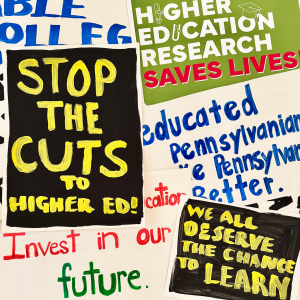Blog
See Dr. Kenneth M. Mash’s remarks to the Board of Governors – Feb. 12, 2026
The Feb. 12 Board of Governors meeting was streamed via YouTube. APSCUF President Dr. Kenneth M. Mash delivered extemporaneous comments. The video is set to start at the beginning of Mash’s remarks:
APSCUF has no ‘outstanding requests’
Avoid scams by practicing vigilance

Photo/Pexels
Some APSCUF members this week reported receiving emails from individuals impersonating chapter presidents (and referencing chapter treasurers) asking for help with “outstanding requests.” While the emails incorporate the publicly available names of APSCUF leaders, closer examination does not indicate our website and/or email system have been compromised. These nefarious emails appear to be phishing attempts to gain trust and obtain personal data and/or financial information. Unfortunately, APSCUF cannot stop these phishing attempts, which are a national issue. We encourage members to be vigilant and cautious regarding suspicious emails, links, or phone calls. Click here to read a past APSCUF post about phishing.
Let’s stand up for higher ed on Nov. 7
 What are you doing on Nov. 7? A coalition of Pennsylvania higher-ed labor unions and higher-education advocates — including APSCUF — is planning Nov. 7 events to call out threats to life-saving research and to the affordability of higher education in the Commonwealth. Events are slated at each of U.S. Sen. Dave McCormick’s Pennsylvania offices — in Allentown, Erie, Harrisburg, Philadelphia, Pittsburgh, Scranton, and State College. Let’s stand together on Friday. Click here for details and to RSVP.
What are you doing on Nov. 7? A coalition of Pennsylvania higher-ed labor unions and higher-education advocates — including APSCUF — is planning Nov. 7 events to call out threats to life-saving research and to the affordability of higher education in the Commonwealth. Events are slated at each of U.S. Sen. Dave McCormick’s Pennsylvania offices — in Allentown, Erie, Harrisburg, Philadelphia, Pittsburgh, Scranton, and State College. Let’s stand together on Friday. Click here for details and to RSVP.
Click here to read today’s press release.
See Dr. Kenneth M. Mash’s remarks to the Board of Governors – Oct. 16, 2025
The Oct. 16 Board of Governors meeting was streamed via YouTube. Below are Dr. Kenneth M. Mash’s comments as prepared.
Good morning, Chair Shapira, governors, returning faculty liaison, chancellor, presidents, and guests. My name is Ken Mash, and I am the president of APSCUF, the Association of Pennsylvania State College and University Faculties.
I’ll begin today by first thanking the chancellor, who has gone out of his way to meet a couple of times already with our individual chapter presidents to get their impressions and their feelings about the way things are going and also to have the opportunity to explain what the System is doing. I think that kind of communication is really admirable, and it does relieve various different kinds of stress.
I would also like to thank President Driscoll for his willingness to attend the APSCUF town-hall meeting concerning the proposed side letter about how our faculty CBA will be treated should all go according to plan with the creation of the College of Osteopathic Medicine. I think it was productive and forthright, and our faculty appreciated the opportunity to hear from you, President Driscoll.
My primary remarks, however, are about the State System budget and the allocation request that will be voted on later today. For years now, the current year notwithstanding, the System has calculated its budget request based on the notion that tuition would not be raised should we receive an “x” percentage of increase.
That increase, of course, was meant to maintain the status quo. APSCUF absolutely applauds the effort to prevent tuition increases, which has been a joint effort of this board, our chancellors, and our governors and the legislature. Again, we all applaud the effort to keep our universities affordable for the sake of our students, their families, and all Pennsylvanians who want an opportunity to take advantage of the many benefits of a college degree.
But it is the “status quo” part of that statement that I want to take issue with. Just in case you haven’t heard, the “status quo” sucks. Programs are being cut, technology needs to be purchased, needed repairs are deferred, services are being reduced, and faculty, coaches, and staff have been pushed to the breaking point, to name only a few issues.
There is too much work to do and not enough people to do that work. Last academic year, I spoke to you about the problem of low morale. Morale is so low precisely because there is not enough money at virtually all of our universities to do right by our students. How can we do right by our students when almost all of our energy is spent figuring out what to cut or defending our jobs from the budget knife?
Whatever one’s thoughts are about the consolidation of six universities into two, it is clear that the two universities have got to be able to answer the question from prospective students and their families about why they should attend those particular institutions. And the answer, given the demographics, cannot just be that it is close by. There would have to be enough students close by.
To attract students and to thrive, which I hope is the goal we share, those universities have to be able to invest to make their campuses attractive. But the “status quo” does not allow for that.
Further, it is clear that our universities are not monolithic, and we should not think that one number will work for all of them. They work off of different sources of revenue, they have different missions, inherited problems caused by prior administrations. The goal should be to find the number that will allow them all to thrive.
Just last year, Gov. Shapiro proposed a 15% increase in the budget of public higher-education institutions for several years. I do not believe that number came out of thin air. It was about having thriving institutions that are affordable, that prepare students for the future, and that position Pennsylvania to have an attractive workforce. I do not know if everyone has seen, but New York has been working overtime to attract students to their state. New York understands the value. It understands the need. We in Pennsylvania must also. We must serve Pennsylvania families and be attractive to potential students outside of the state.
To repeat what I said, the “status quo” sucks. I hope that this board will put forward a budget request that will help our institutions thrive. The System has the data to show what a difference a college degree makes for students’ future lifetime earnings. I urge you to be bold in your request, especially since being bold in this instance means doing what is right.
I can promise you that we, APSCUF, will — regardless of the board’s actions — will push for an increase that reframes the “status quo.”
Millersville University student earns APSCUF scholarship

Lydia Kramer is a member of The University Honors College at Millersville University. Photo courtesy of Lydia Kramer
Millersville University student Lydia Kramer is the 2025 winner of State APSCUF’s $6,000 scholarship, selected by APSCUF’s special-services committee. Kramer is the daughter of Shippensburg APSCUF member Dr. Emily Kramer. The scholarship recipient is majoring in early childhood education. Click here to read more about her.
APSCUF offers a scholarship to relatives of APSCUF or APSCURF members in good standing. The 2026 application will be available on the Students page of the APSCUF website in early 2026.